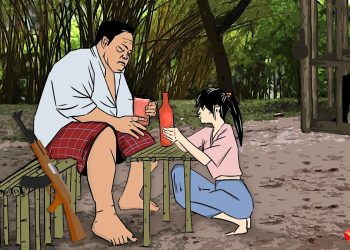Yangon — The Kachin Independence Army (KIA) says the Unlawful Association Act creates a barrier to cooperation between the government and ethnic armed groups in fighting coronavirus.
Article 17(1) of the colonial-era Unlawful Association Act has been used to prosecute people accused of being affiliated with or providing support to armed groups fighting government troops. The KIA is a non-signatory to the government’s Nationwide Ceasefire Agreement but is still in negotiation over a bilateral ceasefire.
“There are many difficulties [with helping fight coronavirus]. For example, we are concerned about Article 17(1). In principle, we can cooperate but, in reality, there will be many challenges,” said KIA spokesman Colonel Naw Bu.
Kachin State social affairs minister U Ne Win, state health chief Dr. Aye Thein and the heads of other government departments held talks with chairman of the KIA’s coronavirus prevention committee chairman Sumlut Gun and Lieutenant General Gun Maw on Wednesday.
Kachin religious leaders, including Kachin Baptist Convention president Reverend Hkalam Samson, attended the meeting, but the Northern Command of Myanmar’s military, which oversees Kachin State, did not send a delegation.
The two-hour meeting could not reach any agreement on practical cooperation, said Col Naw Bu.
“We have to consider all the restrictions, including Article 17(1), which is a concern for Kachin residents and organizations. Cooperation with them is unrealistic. If they are to cooperate, they have to relax those restrictions,” said Col Naw Bu.
The KIA’s central committee said on Thursday that it would prioritize fighting COVID-19 over armed clashes with Myanmar’s military, and that it would cooperate with the government in tackling the pandemic.
At Wednesday’s meeting, the Kachin State government, in cooperation with the National Reconciliation and Peace Center (NRPC), provided 5.7 million kyats (US$4,000) to feed those under quarantine in areas controlled by the KIA. The Kachin State Health Department also shared knowledge about COVID-19 and pamphlets and masks were distributed.
U Zaw Zaw, director of the Kachin State government, said he could not confirm if the government would provide tests for COVID-19 in KIA-controlled areas.
“We can cooperate with the KIA only under the guideline of the NRPC and the coordinating committee led by Dr. Tin Myo Win [of the NRPC]. We have no coordinating committee at the state level,” said U Zaw Zaw.
Myanmar President’s Office in late April formed a committee with armed groups to contain COVID-19 in rebel-held territory.
Around 100,000 civilians live under the KIA and around 150 people are reportedly in its quarantine centers. Since April, the armed group has been building a hospital for COVID-19 patients.
Because government labs are not conducting testing for the KIA, the group has bought test kits for screening and negotiated China over possible lab tests.
A test swab from a coronavirus suspect in Laiza, where the KIA has its headquarters, was taken on April 13 and sent to a Chinese lab. He tested negative.
In an interview with The Irrawaddy in April, Col Naw Bu said the KIA needed medical equipment to treat potential COVID-19 patients, but the government had not provided anything.
The coordinating committee led by Dr. Tin Myo Win held talks with the Karen National Union and New Mon State Party through video conferencing to discuss potential cooperation.
The Ta’ang National Liberation Army and Myanmar National Democratic Alliance Army, which are both engaged in conflict with the government in northern Myanmar, said they were only informed by e-mail about the committee and it has not given practical help or discussed guidelines on cooperation.
The Office of the Commander-in-Chief of Defence Services recently declared a “coronavirus” ceasefire across Myanmar until August 31.
The ceasefire does not apply where terrorist organizations are based, the statement said.
The government declared the Arakan Army to be a terrorist group in late March. The group is engaged in fighting in Rakhine and Chin states.
Translated from Burmese by Thet Ko Ko
You may also like these stories:
What Does COVID-19 Mean for Myanmar’s Peace Process?

















